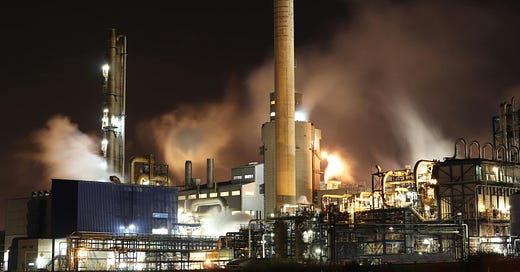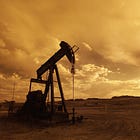Climate Change: Texas' Burden, Texas' Responsibility
The Lone Star State's pivotal role in climate change and our climate future.
Watching extreme weather live streams is one of my regular hobbies. I’ve always had a fascination with extreme weather, especially tornados, I think because I’ve spent most of my life living in this yellow circle:
Over this last week, we saw a severe weather outbreak in Oklahoma and the Midwest. Several times this week, I’ve heard multiple meteorologists and storm chasers say, “I’ve never seen something like this before.” Like when Ryan Hall commented on the numerous tornados hitting the same town again and again last week:
That particular storm spawned 22 tornados in the Norman area, killing four people and injuring 300. And that was just Monday. Then, there was:
A powerful anticyclonic tornado, which is a rare tornado that spins backward.
An EF3 on Tuesday in Kansas killed one and destroyed hundreds of homes.
There were a total of 373 tornados in April, the second most on record.
The tornadoes from April 25 and 26 damaged more than 7,000 single and multi-family homes, costing $2.1 billion in home damage rebuild costs.
On Saturday, Fort Stockton, TX, saw three feet of hail.
The video below happened last Thursday in Hodges, TX. TRIGGER WARNING: it shows and discusses injured children, but you’ll be happy to know the family is okay.
In media interviews with this family, the mom discusses how they hid in a closet in the middle of the House when the tornado hit, ripping the House from its foundation. She said she held on to her children as tight as she could, but the wind ripped her 7-year-old son from her arms and threw him about 25 feet.
Meanwhile, Houston and surrounding areas are underwater and are flooding again.
But haven’t we always had tornados and flooding?
Sure. The point is that they are getting more intense and more frequent.
According to a 2016 study by Columbia University Professor Michael K. Tippett, climate change is intensifying tornadoes. Tippett’s analysis of the tornado record since the 1950s found that the frequency of outbreaks with multiple tornadoes in the US is increasing, and more extreme outbreaks are increasing even faster.
Further reading:
National Geographic: Tornados and Climate Change
Axios: What we know about how climate change affects tornado outbreaks
Center for Climate and Energy Solutions: Tornados and Climate Change
One of the most visible consequences of a warming world is an increase in the intensity and frequency of extreme weather events. We know this. Scientists have warned us for years, and we’re finally seeing it.
What does Climate Change have to do with Texas?
In 2021, the US Energy Information Administration (EIA) estimated that Texas produced 663.5 million metric tons of carbon dioxide (CO2), 13.5% of the country’s total. This is more than double the carbon emitted by California, the second-largest producer. Texas’s CO2 levels have increased by almost 85% since 1970 across all sectors, including transportation, homes, and businesses.
Texas emits more CO2 as a state than Saudi Arabia, Canada, Mexico, and many other countries.
The State of Texas is disproportionately responsible for climate change, more than any other state in America and much more than many countries. This came to my attention at the end of 2022, when Republican State Senators held a special committee, cry babying for the shuttering of an East Texas coal plant.
Can you imagine, in the modern era, simping for coal, after everything we know coal has done to our environment and health?
Currently, there are still 13 coal plants in operation in Texas. Under new rules announced last week by the Environmental Protection Agency (EPA), coal-fueled power plants will have to reduce planet-warming carbon emissions and toxic metal pollution and handle coal ash waste more safely.
A 2023 study showed that coal power plants contributed to 27,000 ‘excess deaths’ of Texans from 1999-2020.
What are Texas Republican Legislators doing about climate change?
No one can say that Texas Republicans aren’t doing anything about climate change because they are bending over backward to make it worse.
Here are some awful bills they pushed through just in the 88th Legislative Session:
HB5: Established various state economic incentives for oil and gas companies to provide high-paying permanent jobs, financially positive economic development, and energy-water infrastructure projects. Wind and solar companies were exempt from this bill. Nearly all Republicans voted for this bill. In the House, 13 Democrats crossed the aisle to vote for it, and in the Senate, 10 Democrats voted for it.
SB1017: This bill prohibits political subdivisions (like counties, municipalities, special districts, etc.) from enforcing any ordinances or regulations that limit access to any energy source, especially natural gas hookups. Cities all over America are banning natural gas in new construction to help achieve environmental policy goals, such as reducing greenhouse gas emissions and improving citizens’ health. But in Texas? Republicans are going full steam ahead. All Republicans voted on this bill. In the House, 24 Democrats crossed the aisle to vote for it, and in the Senate, 10 Democrats voted for it.
HB33: This bill made Texas an “oil and gas sanctuary state.” This bill sought to limit the enforcement of specific federal regulations regarding oil and gas operations within Texas, specifically when those federal regulations impose stricter rules than those established under Texas state law. State agencies and their employees are prohibited from assisting federal agencies or officials in enforcing any federal laws, orders, rules, or regulations that aim to regulate oil and gas operations if such federal regulations are more restrictive than the laws of Texas. All the Republicans voted for it. Every single Senate Democrat voted against it. In the House, 15 Democrats crossed the aisle to vote with Republicans on this bill.
These three bills alone will increase Texas’ carbon emissions and help accelerate climate change.
We know why Republicans vote for these awful bills: climate change denial and fossil fuel money. But why have some Democrats voted on these bills?
That is a good question, one that each one should be held accountable to answer. Some of them we know are just terrible Democrats, like Shawn Thierry and Oscar Longoria. Others have a long history of taking Republican money and doing Republican bidding. Regardless, not all of them will be returning for the 89th Legislature, and the ones who do have another session to redeem themselves, or we should discuss primary contenders in 2026 (but let’s not jump ahead of ourselves).
These are Republican bills and priorities, even if a few straggling Democrats vote on them.
Last week, the US Senate Budget Committee held a hearing on how Big Oil avoids climate change accountability.
What does this have to do with Texas? Texas is the Big Oil Capitol.
Here is the video of the hearing. It’s long (almost three hours), so I’ll re-cap it below.
Senator Sheldon Whitehouse started by explaining why the Senate Budget Committee was holding a hearing on climate change:
Climate upheaval by fossil fuels has a severe economic impact on our economy and the federal budget.
There are economic shocks from disruptions in agriculture and shipping. We already see that impact in grocery stores.
Storms and wildfires are already burdening federal emergency funding and contributing to the collapsing insurance markets in Florida, Louisiana, and Texas.
Fossil fuel subsidies cost America $750 billion per year.
According to Senator Whitehouse, scientists have been raising alarm bells about the fossil fuel industry since 1959.
Representative Jamie Raskin and Senator Whitehouse presented a video with the findings from their investigation.
If you want to see their findings, you can do so at the 12:43 timestamp. They found that since 2015 while claiming to support the Paris Climate Agreement, their joint investigation found in over 2 million internal documents from Exxon showed that Exxon used double-speak to avoid the climate agreement.
Between 2013 and 2018, Shell launched a series of reports touting plans for achieving net-zero emissions while telling employees and lobbyists that they should not imply or suggest that it is a target for Shell.
Since the early 2000s, Big Oil has pushed natural gas as a clean, green energy solution. Except, natural gas isn’t clean, and it’s not green. Natural gas is methane, which produces a greenhouse gas that is more potent and climate-destructive than CO2. Some scientists believe that natural gas is just as harmful as coal.
A 2019 email exchange uncovered by this investigation between BP lobbyists and colleagues showed an MIT study that methane emissions from natural gas offset climate benefits. Yet, internal documents show that BP wanted to continue pushing natural gas as a low-carbon alternative to coal.
They showed a video, which an Exxon lobbyist caught on tape, describing how Exxon uses the American Petroleum Institute (API) to take the heat for them in Congress.
The joint committee investigation found:
Big Oil intentionally spread disinformation about the safety of natural gas and engaged in propaganda about its commitment to reducing greenhouse gases.
Big Oil publicly broadcast and advertised its interest in low-carbon technologies while internally acknowledging these were pie-in-the-sky ideas that were expensive and difficult to scale.
Big Oil relies on the API to spread misleading narratives to the public and political lobby against effective climate change solutions while pumping $700 million into universities and academia to influence pro-natural gas studies.
Big Oil is not addressing the climate crisis but profiting from it.
Where do we go from here?
As of April 2024, more than 40 jurisdictions in the US are suing Big Oil companies for climate change damages and deception. The lawsuits claim that oil companies knew their products caused climate change but misled the public for decades. The lawsuits also argue that the companies’ practices violate laws, including consumer protection, public nuisance, fraud, and racketeering.
The hearing held by the Senate Budget Committee discussed how the US Department of Justice (DOJ) filed its civil lawsuit against major tobacco companies in 1999 under the Racketeer Influenced and Corrupt Organizations Act (RICO). This landmark case, known as United States v. Philip Morris et al., proved that tobacco companies had engaged in a long-standing conspiracy to deceive the American public about the health risks of smoking and the addictiveness of nicotine.
It’s time for the DOJ to sue Big Oil like they sued Big Tabbaco.
As long as Republicans hold Texas’ executive branch, there is no chance that a lawsuit against Big Oil will come from the State of Texas.
ERCOT is a massive problem in Texas, skirting us away from more clean energy solutions and contributing to the massive corruption between Big Oil and Texas politics that has taken place for years.
Congressman Greg Casar has introduced a bill in Congress to force Texas to connect to the national grid.
Unfortunately, as long as Republicans hold Congress, we probably won’t see movement.
If Texas cities and counties decided to sue Big Oil companies independently, they would face tremendous legal and political hurdles because Texas’ preemption laws restrict their ability to pursue certain types of litigation.
Climate change is getting worse, and with that, extreme weather is getting worse.
As long as Republicans are at the helm, that isn’t going to change. Texas is a state pivotal in the narrative of global climate change due to its substantial fossil fuel production and consequential CO2 emissions.
The recent severe weather events and scientific studies provide undeniable evidence that our current trajectory is environmentally and economically unsustainable. We, the people, need to demand accountability and encourage legislative reform that prioritizes sustainable energy sources over fossil fuels.
This involves voting for representatives who will champion such reforms and supporting local and national movements that aim to challenge and change the entrenched relationships between politics and Big Oil.
For Texas, we either continue down a path of environmental degradation and climate denial or lead the charge in adopting innovative, sustainable solutions that could shape a healthier planet for future generations, who we elect in November matters if we want to change our current path.
Vote early, vote often, just vote.
Important 2024 primary RUNOFF election days:
May 17, 2024: Last day to apply by mail
May 20, 2024: First day of early voting.
May 24, 2024: Last day of early voting.
May 28, 2024: Last day to receive a ballot by mail.
May 28, 2024: Election day.
LoneStarLeft’s Newsletter is a reader-supported publication. To receive new posts and support my work, consider becoming a free or paid subscriber.
Follow me on Facebook, Twitter, TikTok, Threads, YouTube, and Instagram.








Excellent writing Michelle! Hubs and I are def better informed because of it. We're def living in scary times. Thank you for all that you do!
ask Florida insurers what they think about climate change? answer: they are leaving the state